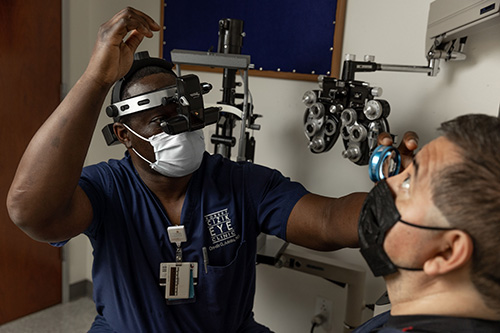Neuro-Ophthalmology
What are Neuro-ophthalmology and Neuro-ophthalmologists?
Nervous system diseases can cause a wide range of symptoms and vision complications, and our neuro-ophthalmologists are the specialists who evaluate and treat patients with vision problems that originate in the brain or optic nerve, rather than the eye itself. Symptoms, which include pain, blurred vision, and vision loss, can be difficult to distinguish from other conditions and can be indicative of underlying problems, making it imperative to receive an accurate diagnosis as soon as possible.
 Some of the conditions we diagnose and treat include ptosis, blepharospasm, optic neuritis, orbital tumors, adult strabismus, thyroid eye disease, optic nerve edema, optic nerve sheath meningioma, and double vision and eye movement abnormalities. Our neuro-ophthalmologists use state-of-the-art equipment and extensive expertise in problems of the eyes, brain, nerves, and muscles to quickly and accurately diagnose and treat your condition.
Some of the conditions we diagnose and treat include ptosis, blepharospasm, optic neuritis, orbital tumors, adult strabismus, thyroid eye disease, optic nerve edema, optic nerve sheath meningioma, and double vision and eye movement abnormalities. Our neuro-ophthalmologists use state-of-the-art equipment and extensive expertise in problems of the eyes, brain, nerves, and muscles to quickly and accurately diagnose and treat your condition.
In addition to medical school, our neuro-ophthalmologists have at least five years of clinical training and are board certified in neurology, ophthalmology, or both, making them highly qualified to diagnose and treat your specific issues.
Reasons to see our Neuro-ophthalmologists
More than half of the brain is involved in vision-related functions, so injuries, strokes, tumors, and infections can trigger nervous-system issues that impact vision. Patients may notice headaches, facial pain, blurred vision, or difficulty controlling eye movement. In some cases, the symptoms could be caused by an underlying systemic disease, such as lupus, multiple sclerosis, or thyroid disease.
In other cases, trauma, a tumor, or orbital inflammation can cause injury to the optic nerve, interrupting the transfer of visual information from the retina to the brain. Swelling and a restricted blood supply can also cause a variety of visual symptoms for the same reason. Certain antibiotics can even trigger vision problems.
What you can expect at the Robert Cizik Eye Clinic
The Cizik Eye Clinic opened in 2007 and is housed in Memorial Hermann Plaza at 6400 Fannin Street. It includes dozens of exam areas, multiple operating rooms, and laser suites equipped with the most sophisticated equipment available for patient care.
People travel from across the country and the world for treatment at the Cizik Eye Clinic, in part because our affiliation with McGovern Medical School at UTHealth provides unmatched resources and expertise. Our friendly staff works diligently to make your visit pleasant and efficient, as we maximize patient flow through everything from routine eye exams to the most advanced eye surgeries.
Our physicians are faculty members at McGovern Medical School at UTHealth and are board certified by the American Board of Ophthalmology or are board eligible. At the Cizik Eye Clinic, we understand that the eye is a small part of a whole patient who deserves top-notch, comprehensive care in a cutting-edge facility.
Learn more about what to expect during your visit here »
How to prepare for your appointment
Please allow several hours for your first appointment, as a complete neuro-ophthalmic evaluation often requires in-clinic testing, a review of medical records, a patient interview, and a comprehensive eye exam. Your visual fields, visual function, and eye structure will be thoroughly examined, among other items.
Please have your medical records and imaging results sent to the neuro-ophthalmologist prior to your appointment and bring copies yourself if you have them. Do not wear eye makeup and please plan to have someone drive you home from the appointment, as your eyes will be dilated during the exam.
Your treatment plan will depend on your specific condition. Options may include a medical therapy, or a procedure such as botulinum toxin injections to stop muscle spasms or a surgical procedure such as optic nerve sheath fenestration for severe vision loss from Pseudotumor Cerebri. Most treatments can be done in an outpatient setting.
Related Conditions

 Some of the conditions we diagnose and treat include
Some of the conditions we diagnose and treat include